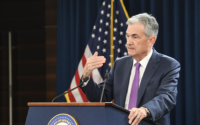Goldman’s former chief economist calls for BRICS to challenge USD dominance as China leads de-dollarization trend
| Get all the essential market news and expert opinion in one place with our daily newsletter. Get comprehensive recaps of the day’s top news stories straight to your inbox. Sign up here! |
(Kitko News) Former Goldman Sachs chief economist Jim O’Neill is calling for the BRICS bloc to expand and challenge the dominance of the US dollar. China’s recent actions with the yuan are already doing just that.
O’Neill said that the dominance of the dollar destabilizes the monetary policies of other countries, which is why the bloc made up of Brazil, Russia, India, China and South Africa should counter it.
“The US dollar plays a very influential role in global finance,” he wrote in a paper published in the journal Global Policy. “Whenever the Federal Reserve Board has initiated a period of monetary tightening, or conversely, loosening, the consequences and knock-on effects on the dollar’s value have been dramatic.”
This was on display over the past year as the Fed pursued its sharpest pace in decades to reduce inflation, bringing its key policy rate from near zero to a range of 4.75%-5%.
O’Neill sees the dominance of the dollar as a burden for nations with dollar-denominated debt because their monetary policies become unstable when the exchange rate fluctuates.
The ex-Goldman chief economist who coined the group’s name now called BRICS to expand to create a fair, multi-currency global system by including emerging countries such as Mexico, Turkey, Egypt, Indonesia, Bangladesh, Vietnam, Pakistan and are invoking. Philippines.
At the same time, O’Neill urged the group to apply stricter criteria when admitting new members, focusing on climate finance, health care and trade.
More than a dozen countries have expressed interest in becoming members of the group. This year, the bloc plans to determine whether to admit new members and establish entry criteria. According to media reports, Saudi Arabia and Iran are among those that have formally asked to join.
O’Neill said new members should be more from countries with large populations and sizable economies.
BRICS needs to work on expanding its influence with the World Bank and the International Monetary Fund. According to the Institute for Security Studies in Pretoria, BRICS represents 42% of the global population, but its members hold less than 15% of the voting power in both institutions.
The trend of de-dollarization by countries like China and Russia grabbed headlines last year. Central banks bought a record amount of gold in 2022, led by emerging countries such as Turkey and China. And that interest is rolling forward into 2023.
More recently, China has used the yuan as a trade settlement mechanism. Yuan-denominated trade flows between Russia and China increased last year. And last week, Russian President Vladimir Putin said he supports using the Chinese yuan for trade deals between Russia, Asia, Africa and Latin America. This statement came after the Chinese leader’s visit to Moscow.
Another historic move by China was the completion of the first yuan-settled LNG trade, carried out between the Chinese national oil company and France’s Total Energy through the Shanghai Petroleum and Natural Gas Exchange.
China also struck a deal with Brazil to trade in their country’s currencies, AFP reported this week, citing the Brazilian government. China has been Brazil’s largest trading partner since 2009.
In other areas of cooperation, Saudi Arabia approved the decision to join the China-led Shanghai Cooperation Organization (SCO) as a dialogue partner. The SCO is a political, security and trade alliance created in 2001 to counter Western influence. Its members include China, Russia, India, Pakistan and four Central Asian countries.
Earlier this week, China and Saudi Arabia signed major oil deals. State-owned oil company Saudi Aramco will take a $3.6 billion stake in Rongsheng Petrochemical Co Ltd in a bid to increase its presence in China. In addition, the two countries agreed to build an integrated refinery and petrochemical complex in Northeast China.
“Saudi Arabia appears to be turning towards Beijing and away from the West,” said Jason Tuve, deputy chief emerging markets economist at Capital Economics. “This has fueled talk of Saudi accepting the renminbi for oil sales to China; the so-called ‘petroyuan’.”
Beijing is also becoming a major lender to debt-heavy countries such as Turkey, Argentina and Sri Lanka. In 2021, China will loan $40.5 billion to troubled countries, The New York Times reported, citing data provided by AddaData. In comparison, the IMF has loaned $68.6 billion to countries in financial crisis in 2021.
The reduction of the US dollar to its reserve currency status is attracting the attention of many public figures. Responding to a tweet by Grit Capital CEO Geneviève Roch-Decter on the subject, Elon Musk replied that it is a “serious issue” and that US policy is “very heavy-handed, making countries want to ditch the dollar.”
serious issue. US policy has been very harsh, causing countries to abandon the dollar.
— Elon Musk (@elonmusk) March 29, 2023
Disclaimer: The views expressed in this article are those of the author and may not reflect his/her views Kitco Metals Inc. The author has made every effort to ensure the accuracy of the information provided; However, neither Kitco Metals Inc. nor the author can guarantee such accuracy. This article is strictly for informational purposes only. This is not a solicitation to exchange goods, securities or other financial instruments. Kitco Metals Inc. And the author of this article is not liable for damages and/or damages caused by the use of this publication.
Source: www.kitco.com
[ad_2]
Source link


